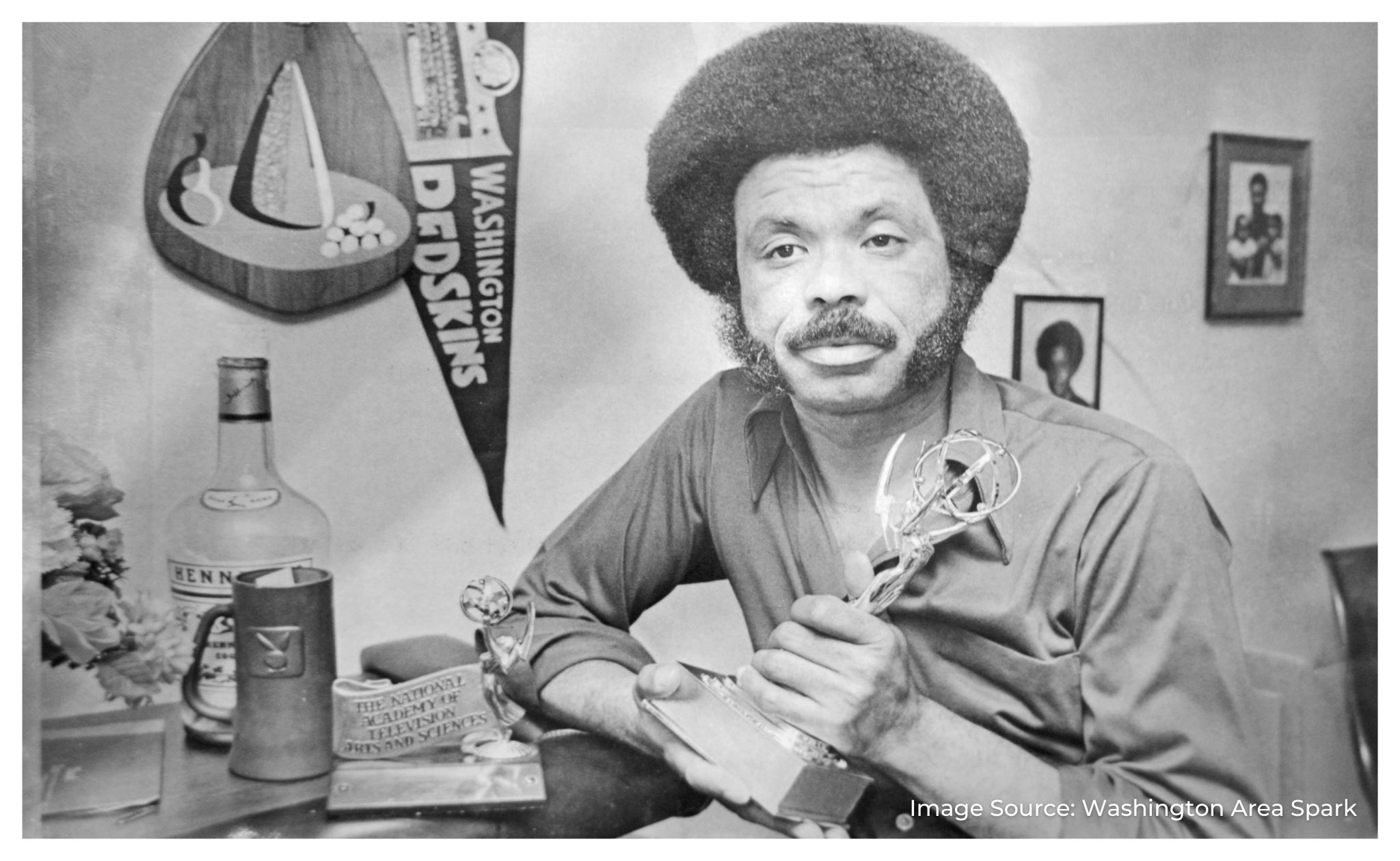Our History
The PGP honors Petey Greene’s legacy by providing and advocating for the highest quality education for incarcerated and formerly incarcerated people and educating volunteers on the injustice manifest in our carceral system.
Shaw Poverty Organizer Petey Greene 1967_Washington Area Spark
The PGP is named after Ralph Waldo “Petey” Greene (1931-1984), a pioneering Black media personality, community organizer, and civil rights activist who used his wit and popularity to shine a spotlight on structural inequality and systemic racism. Formerly incarcerated himself, Petey Greene was a consummate storyteller and truth teller who used his talents to raise awareness about issues ranging from poverty and income inequality to domestic violence.
Petey Greene spoke often about the structural barriers facing formerly incarcerated people. In a segment titled Hustlin’ Backwards Greene marvels at the fact that credit card applications never ask about his history of incarceration, but employment applications do: “When I fill out for a credit card, they never ask me if I ever been locked up—they only ask how much money I make. But when I was tryin’ to get a job they would always ask me had I been to jail…I wonder sometimes, do we understand that the system is hustlin’ backwards? ….If we were to hire people, as opposed to wonderin’ about their record, and then...if they go off…go ahead and fire them, as opposed to all kind of bad breaks, and they can’t get no jobs… people need jobs.”
In a 1971 NPR interview, Petey Greene recounted the first time he understood that “something must be wrong with the system.” At eight years old, Greene had set fire to a tree out of frustration that some older boys wouldn’t let him join their football game. He was incarcerated for a year in a juvenile detention facility. He recounts, “I remember thinking, George Washington cut down a tree, they make him president of the United States; I burned down one, they gave me a year in jail. I knew then something was wrong with the system.”
In the same interview, Greene describes how the system that was nominally designed to support returning citizens was equally broken. “When I got out [in 1965] and was ready to straighten out, a parole officer told me, ‘I ain’t got to worry about you Petey, you been coming back and forth to the penitentiary all your life, so all I gotta do is wait a couple of weeks and you’ll be back in here.’ But this isn’t what he should have said. His job was to help me get a job, hook me up with a place to stay and get me a program and get me ready to come back to mainstream society. So I walked out. Hurt, but I wasn’t beat. I said to myself, Imma prove to this dude that he’s a liar.”
Within three years, Petey Greene was a successful host of two Washington, D.C., shows: “Rappin’ with Petey Greene” and “Petey Greene’s Washington,” which ran for over a decade on local radio and television. Greene won two Emmy awards for his work, and in 1981 “Petey Greene’s Washington” became one of the founding programs on the newly formed Black Entertainment Television (BET), cementing Greene’s status as a pioneer of Black broadcasting.
Petey Greene with his constituents_Washington Area Spark
Lurma Rackley, who collaborated with Greene on his posthumously published autobiography, explains in an interview that current descriptions of Petey Greene as an early “shock jock” miss the mark: “Petey wasn’t a DJ as the movie [Talk to Me] portrays him, he was a public affairs talk show host, in the early days of talk shows, when they were restricted to Sunday afternoons.”
Rackley continues, “His legacy would be one of speaking truth. In my book [Laugh if You Like] he talks about his desire to be an example for people and to hold responsible the powers-that-be to make sure everybody got a fair shake.”
The Petey Greene Program (PGP) was founded in 2008, long after Petey Greene’s death, by Charlie and Cordie Puttkammer, a progressive Princeton graduate who met Greene in 1965, when both men worked at the United Planning Organization in Washington, D.C., supporting formerly incarcerated people. Although they worked together for just a couple of years, Petey Greene’s charisma and commitment to social justice made a lasting impression on Puttkammer. Years later, when he established a program to bring volunteer tutors into the A.C. Wagner prison in New Jersey, he had no doubt about what to name the new organization: “It simply had to be the Petey Greene Program because of my memories of Petey Greene,” Puttkammer explains.
The PGP seeks to honor Petey Greene’s legacy of social justice advocacy and truth-telling by supporting the educational journeys of currently and formerly incarcerated students and educating both tutors and the public about the ways in which, in Petey Greene’s words, “something [is] wrong with the system.”
Learn more
Recollections from Petey Greene’s nephew Thabit (Terrence) Greene, who produced the 2009 documentary Adjust Your Color: The Truth of Petey Greene (Adjust Your Color trailer).
T.V. Commentator Petey Greene Dies, The Washington Post.
Petey Greene Still Gets Laughs, Even in Death. NPR interview with Lurma Rackley.
Talk to Me (Trailer) | Talk to Me (Amazon)
‘Petey’ Greene: Pioneering Shock Jock, D.C. Icon. NPR interview with Kasi Lemmons and Don Cheadle.
All images on this page are sourced from the Washington Area Spark Flickr account.



